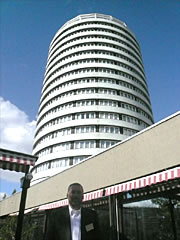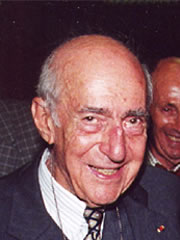| The 6th International
Conference on Low Dose Radiation Effects
on Human Health and Environment (LOWRAD)
was held on October 17-20, 2007, in Budapest,
Hungary. Venue of the meeting, Hotel Budapest,
built several decades ago and notable with
its modernistic cylindrical-shaped architectural
style, is located at the foot of the Castle
Hill nearby to the centre of Buda. Meeting
was well organized with all facilities available
conveniently at the hotel.
The importance of studying biological and
medical consequences of exposure to low
doses of ionizing radiation stems from
the necessity to understand effects which
otherwise could not be observed after high
radiation doses. Of note, hundreds of thousand
people on the globe have been already exposed
to low radiation doses due to A-bombing
of Japan, technogenic catastrophes such
as Chernobyl accident and during nuclear
weapon testing in Semipalatinsk and other
sites of the world. Also humanity is permanently
dealing with low exposures from the environment,
medical procedures, consumer goods, and
from the professional activities in some
groups of people. It still remains essential
to refine radiation safety policies and
guidelines, with regard both public health
protection and occupational exposures.
Difficulties of evaluation of low radiation
dose effects are objectively associated
with a non-monotonic character of the dose-effect
relationship in very low dose range, seen
for example as a low-dose hyper-radiosensitivity/increased
radioresistance phenomenon. Applicably
to more complex biological systems, such
as organisms, interpretation of low dose
effects encounters even greater intricacy,
especially in the context of the Linear
Non-Threshold (LNT) model of radiation
response. Substantial attention at the
conference was devoted to the studies of
classical low dose effects, i.e. bystander
effect, adaptive response and genomic instability
and its manifestations after exposure to
low doses of radiation of different quality.
A bright event has been Marie Curie Award
Lecture by Maurice Tubiana, a patriarch
and a worldwide known expert in clinical
and experimental radiobiology. A grand
overview of the progress in radiation effect
studies with particular stress on radiation
oncology was presented which made an indelible
impression.
As a whole, the conference was cognitive
and useful. Attending it could be recommended
to established as well as young scientists.
Program and abstracts could be retrieved
from
http://www.osski.hu/lowrad2007/LOWRAD2007_program_book.pdf
 |
|
 |
| Hotel Budapest |
|
Dr. Maurice Tubiana |
|